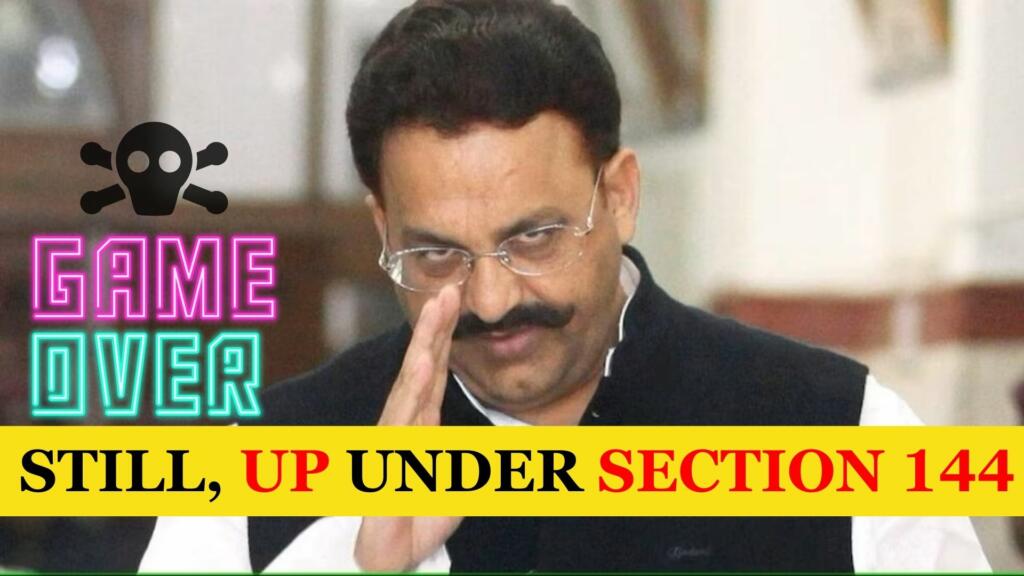Mukhtar Ansari, a former MLA who walked a tightrope between politics and crime, is no more. The gangster-turned-politician, facing over 60 criminal cases, recently died in a Uttar Pradesh prison. His death sparked tension, leading authorities to impose Section 144, a measure restricting large gatherings, across the entire state. This unusual step begs the question: why was Uttar Pradesh put on such high alert?
Who was Mukhtar Ansari?
Mukhtar Ansari, who passed away recently in a Banda prison, was a figure shrouded in both political power and criminal notoriety. He carved a unique path in Uttar Pradesh, serving as a five-time MLA while facing a staggering number of criminal charges.
Ansari’s political career began in the 1990s. While details of his early political involvement are murky, his alleged criminal activities in districts like Mau, Ghazipur, Varanasi, and Jaunpur were already well known. This didn’t stop him from entering the electoral fray, and in 1996, he secured his first MLA seat, representing the Mau constituency. Interestingly, he contested on a Bahujan Samaj Party (BSP) ticket, a party known for its focus on social justice. He went on to win the Mau seat four more times, twice under the BSP banner and twice as an Independent candidate.
However, Ansari’s political career was constantly overshadowed by his criminal background. He faced over 60 criminal cases, including charges of murder, extortion, and kidnapping. While some convictions came later in his life, the allegations cast a long shadow. In September 2022, he was finally sentenced in eight cases by different courts in Uttar Pradesh.
How did He die?
Mukhtar Ansari, a gangster-turned-politician, died at a hospital in Uttar Pradesh. While officials say he suffered a cardiac arrest, his family alleges foul play. Ansari’s brother and son claim he was poisoned in jail multiple times, with the latest incident happening on March 19th. Jail authorities deny these accusations.
The circumstances surrounding Ansari’s death have added a layer of controversy. While official reports cite a cardiac arrest, his family members, including his son Umar, vehemently reject this explanation. They allege slow poisoning over a period of time, raising suspicion about his treatment in prison. This accusation has yet to be substantiated and an investigation is ongoing.
Also Read: Why Every Indian Parent Should Push Their Kids to Watch “Swatantrya Veer Savarkar”
Politics & Crime: Two Acidities of Ansari
Mukhtar Ansari’s story exemplifies the complex relationship between politics and crime in some parts of India. His ability to win elections despite his criminal record raises questions about the influence of muscle power and intimidation in certain constituencies. His death, coupled with the allegations of foul play, has further heightened tensions in Uttar Pradesh, leading to the imposition of Section 144, a measure aimed at preventing large gatherings and potential unrest.
With Ansari’s passing, a chapter closes on a controversial figure who embodied both political ambition and alleged criminal activity. Whether his death will mark a turning point or simply be another chapter in the saga of crime and politics in Uttar Pradesh remains to be seen.
Section 144?
The death of Mukhtar Ansari in a Uttar Pradesh prison triggered a security lockdown across the state. This heightened vigilance can be attributed to two key factors: the potential for unrest and the implementation of Section 144.
Section 144 is a precautionary measure authorized under the Criminal Procedure Code (CrPC). It empowers authorities to temporarily prohibit gatherings of four or more people in a specific area. This is often used to maintain law and order in situations where large crowds might lead to violence or disruption.
Uttar Pradesh on Edge
In Ansari’s case, the potential for unrest arose from several factors. Large crowds gathered outside his residence in Ghazipur and the Banda hospital where he died. These gatherings could have escalated into protests or violence, especially considering Ansari’s history and the allegations surrounding his death. Additionally, his stronghold districts like Mau and Varanasi might have witnessed similar unrest from his supporters.
To preempt such possibilities, Uttar Pradesh authorities implemented Section 144 across the state. Furthermore, they deployed additional security forces, particularly the Central Reserve Police Force (CRPF), in sensitive districts. The CRPF, a specialized paramilitary force, is often deployed to handle situations requiring crowd control and maintaining law and order.
By taking these steps, the government aimed to prevent any potential violence or chaos that could erupt following Ansari’s death. The deployment of additional security forces serves as a deterrent and ensures that authorities have the resources to effectively manage any situation that might arise.
Despite his political career, he faced numerous criminal charges and recent convictions. His death, shrouded in allegations of poisoning by his family, has sparked controversy.
To maintain order, Uttar Pradesh went on high alert with Section 144 imposed and additional security forces deployed. This response stemmed from concerns about potential unrest due to large gatherings and his stronghold districts. With an investigation underway and opposition leaders demanding a probe, Ansari’s death remains a complex issue with lingering questions.
Also Read: Mama, I’m in Love with a Criminal: Witness The Gangster Wedding
